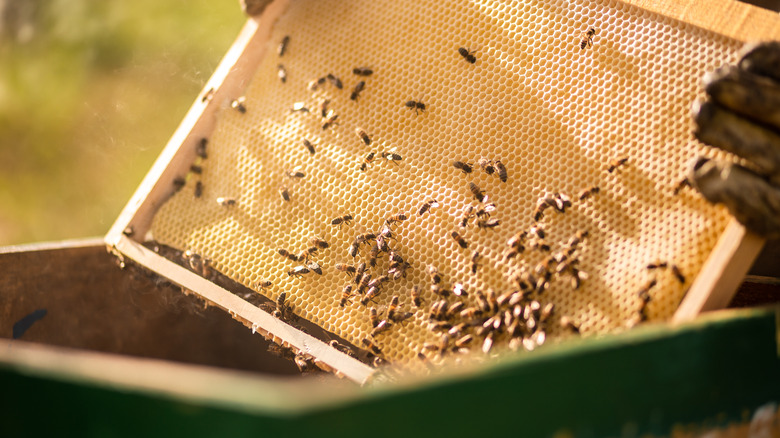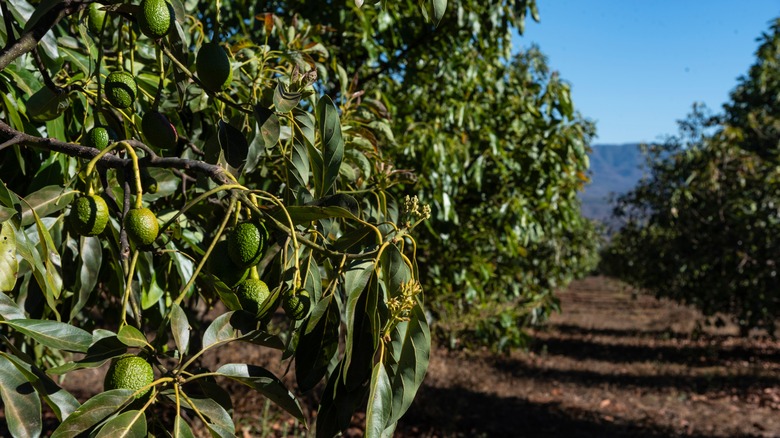Why Some People Believe Avocados Aren't Vegan
In recent years, the avocado has seen a total transformation from health food to normal dietary staple. U.S. avocado consumption has increased six-fold in the last 30 years: It skyrocketed from 436 million pounds in 1985 to a whopping 2.7 billion pounds in 2020. And for good reason.
Avocados are versatile ingredients, packed with an impressive amount of health benefits. Per WebMD, just one cup of sliced avocado packs 3 grams of protein; mashed, it will give you 4.6. They're also rich in fiber and many of the nutrients that are often lacking in people's diets, including magnesium, B6, vitamin C, vitamin E, and potassium, per Healthline.
These nutrients have made avocados an integral part of vegan cooking. A vegan diet, according to the authorities at the Vegan Society, "seeks to exclude—as far as is possible and practicable—all forms of exploitation of, and cruelty to, animals ... In dietary terms it denotes the practice of dispensing with all products derived wholly or partly from animals." By this definition, avocados have been the target of some strict vegan criticism. But why? Definitively, are avocados actually vegan?
The ethical concerns of migratory beekeeping
Much of the resurgent skepticism was instigated by an episode of BBC quiz show "QI." Contestants were asked which of the following foods were vegan: almonds, avocado, cantaloupe, kiwi, or butternut squash. Contestant Alan Davies answered, "Any of them," to which moderator Sandi Toksvig responded that, actually, none of these foods belong in a strictly vegan diet, in the same way that honey isn't vegan. She explains that all of these crops rely on bees, and since these particular crops are difficult to cultivate, the bees are treated in an "unnatural way."
That unnatural way Toksvig is talking about is called migratory beekeeping — and unnatural might be putting it lightly. In migratory beekeeping, colonies of bees are transported via flatbed trucks and forklifts from one crop to another, usually across different states with different climates, according to beekeeping company Wildflower Meadows. The bees are shipped into these fields and pollinate the crops when the plants are fertile, then move on to the next in-season field.
This is damaging to bees for a number of reasons. The forced proximity of the colonies is conducive to the transfer of diseases, mites, and fungi, says Scientific American, not to mention the pollination and transportation cycle yo-yos bees between times of plenty and near starvation. However, according to Scientific American, the U.S. would lose roughly one-third of all its crops without migratory beekeeping, including broccoli, blueberries, cherries, apples, melons, and lettuce. It's a huge part of U.S. agriculture.
Are avocados vegan after all?
Whether or not you consider avocados to be vegan largely depends on your definition of veganism. Ethically, migratory beekeeping definitely introduces a dilemma. Kantian consumers might argue that bees should be treated as an end in themselves and not as a means to something else; they exist, and therefore they have inherent value. However, this depends on whether you consider insects to be sentient or capable of suffering in the same way as humans.
Definitively, avocados are vegan: They do not contain actual animal meat or animal byproducts. The key idea here is conscientious consumption. In a non-vegan world reliant on commercial beekeeping, Vegan Food and Living says, it simply isn't realistic for everybody to avoid all forms of animal exploitation. Vegans can only be vegans within the parameters of their culture. There are smaller farms that don't rely on migratory beekeeping for their produce, but many of them are only open seasonally, and it isn't possible or practical to expect everyone to have access to these types of farmer's markets, notes Vegan Life magazine.
Plus, especially with all the restrictions in a vegan diet, it's still necessary to obtain all the essential nutrients from food, per VeganFriendly.org. PETA Executive Vice President Tracy Reiman agreed. "Going vegan is about making kind choices that bring about positive change," she said, per Fox News. "They can [still] save nearly 200 animals' lives every year by choosing plant-based foods instead of meat, eggs, and dairy 'products.'"


